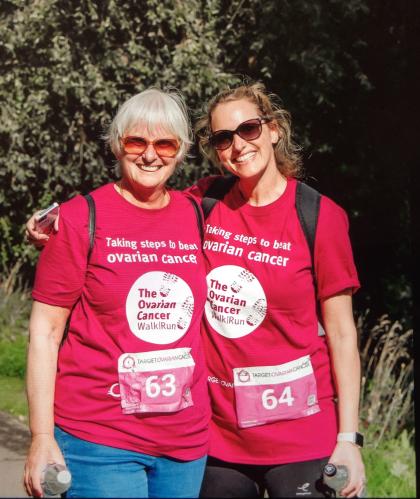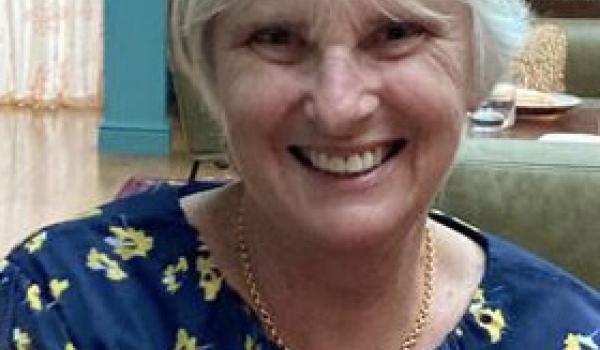A little over two years on from her diagnosis, Liz took part in the Ovarian Cancer Walk|Run in London with her daughter, Sarah, and raised over £1,000. Liz found that by attending the walk and speaking to other people in a similar situation was a really positive experience.
Initial concerns
I was mainly asymptomatic. It was in late March 2020 that I started to feel that something was not quite right. Due to Covid and lockdown restrictions, I decided not to contact my GP but wait until lockdown was over, which I assumed would be short lived. As the weeks passed, I noticed frequent bloating and, despite cutting down on baking and eating less, my summer dresses wouldn’t fit and my jeans wouldn’t fasten.
Finding out my diagnosis
It was a summer’s day in July 2020. My husband, David, was sat in the hospital car park waiting for me to return from an ultrasound (which I had requested to be carried out privately after contacting the GP surgery about my persistent bloating and not getting anywhere).
I was chatting to the radiologist as he scanned my abdomen, but suddenly the atmosphere changed and he became very quiet. He had spotted fluid in my abdomen – he couldn’t exactly see what was going on but suggested that I be referred urgently to see a consultant colleague of his.
A fortnight later, after further tests, I walked into the hospital with David by my side and sat down in the consultant’s office. Although not entirely sure (being a bowel consultant), his suspicion was that I had ovarian cancer and I needed to start treatment as soon as possible.
He had taken the liberty of booking an appointment with a gynaecological oncologist the following morning, who confirmed the diagnosis and discussed the treatment plan with us.
Although we were still under lockdown restrictions, I was very fortunate that David was with me for both of these appointments. People generally only tend to take in 50% of information they receive and I think that between us we were able to process most of what was involved.
Facing treatment alone
Everything moved really quickly following the appointment with the oncologist. I felt that once there was a plan in place, I could deal with the situation. Three sessions of chemo, surgery and then another three sessions of chemo taking me through to the end of the year.
I started chemotherapy a week after that appointment. The sessions were long and draining and I would get home exhausted at the end of the day, ready for a bowl of soup and bed!
When it was time for my surgery, we were still under lockdown restrictions which meant I couldn’t have any visitors. The surgery was lengthy, I needed a complete debulking procedure to remove any signs of cancer.
Fortunately, the spleen did not need to be removed and there was no damage to the bowel. I can only imagine my family’s relief when they phoned the ward, to be told that the surgeon had removed all signs of cancer which were visible to the naked eye.
I was in hospital for seven days. I must say that I found this incredibly tough since I was not allowed any visitors. I found Facetime calls very upsetting, when what I really needed was a cuddle.
However, I got on with it, as I had to, but would I recommend this? No. Having someone to hold my hand would have made the biggest difference to us all during that time.
It's not mind over matter
I started chemotherapy again four weeks after surgery. For me chemotherapy was not a case of not ‘mind over matter’. Shortly after the chemotherapy I would feel unwell and extremely tired.
I learnt to prepare for these low days by making sure there was enough food in the freezer so David and I could still enjoy home-cooked food when I was not up to cooking. David still maintains that in many ways hard as lockdown was, it also had its benefits as were unable to socialise. As a result, I was less exposed to possible infections.
Double edged sword
I found the hardest part of my ovarian cancer diagnosis and treatment to have been the impact on my family. Having to hug and reassure my children and older grandchildren that I will be here next week, being separated from my husband while I had major surgery, and waiting to find out if my children could be at risk too.
Would it have made a difference if I had received my diagnosis sooner? I don’t know, but this thought still keeps me awake in the early hours of the morning when my demons ‘come out to play’.
I was tested for the BRCA mutation shortly after surgery. Waiting for the result, my worst fear that if I was BRCA positive, (which was a strong possibility as I'm an Ashkenazi Jew) my children could be at risk of having the mutation too.
I was relieved for my children when the test returned confirming I was BRCA negative as I would have felt extremely guilty if I had passed on this mutation to them.
Where I am now
I'm very fortunate that, once I finished chemotherapy at the end of December 2020, Niraparib had just been licenced as first line maintenance treatment. I started taking Niraparib in February 2021. There were quite a lot of unpleasant side effects for the first three months but now that I've adjusted to the drug, I'm doing well.
We've been for weekends away, enjoyed long walks and I recently took part in the Ovarian Cancer Walk|Run October 2022 event, where my daughter and I raised over £1,000 thanks to the generous support of my wonderful family and friends.
The Walk | Run was a brilliant opportunity to speak to people in a similar situation. For a long time, I was reluctant to talk to other people about my cancer but found chatting to other women and finding out how they are coping a very positive experience. For me, I still struggle with my 3am wobbles and anxiety over the variations in my CA125 levels, which have started to go up slightly.

What I want to see happen
I hope by sharing my experience this helps someone else.
I also want to see ovarian cancer profiled better, across all well women’s clinics and brought into the conversation and CA125 blood tests regularly incorporated into health checks.
And I want everyone to be listened to by their doctors and GP teams when they have concerns that something may be wrong, particularly since there has been zero contact with my own GP throughout this entire process.
If you’ve been affected by this story and would like to speak to a specialist nurse, you can call our dedicated support line on 020 7923 5475 or contact us: [email protected]. We're open from 9am until 5pm, Monday to Friday.
If reading this story has helped you, join the Ovarian Cancer Community to connect with more people affected by ovarian cancer: www.targetovariancancer.org.uk/onlinecommunity



